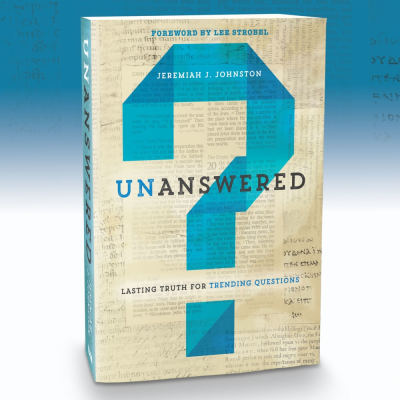Does God's Silence Mean You've Sinned? Apologist Jeremiah Johnston Answers

For many Christians the purpose of prayer is to commune with God and to seek answers. Some answers come right away, others with time. But when God shows prolonged silence, when there seems to be no answer from Him at all, is it a sign of His chastisement? Has the believer done something wrong?
In his new book Unanswered, a volume six years in the making that intends to shed light on hot-button topics within today's Church, apologist and New Testament scholar Jeremiah Johnston gets candid about he and his wife's personal test in trusting God through His silence.

"We always wanted children," Johnston wrote in Unanswered. "We never could have dreamed that two healthy people, who loved God with all of their hearts, would be unable to conceive a child."
When the Johnstons finally did get an answer, however, their lives changed in ways they could never have expected. When it comes to asking God for what you want, the Bible scholar told The Christian Post last month, "You better be ready for the answer … "
Two years after Jeremiah and his wife, Audrey, first began to seek God for a child they were still waiting on an answer. People at their church, genuinely concerned and praying that the couple would get their heart's desire, often asked Audrey, "Are you pregnant yet?"
To make matters worse, Johnston — an associate pastor at his Texas-based church — was one day asked to pray for a couple. While there was nothing unusual about that, the subject of the prayer request was ironic: the couple sought prayer for their fertility.
Johnston was blunt when he told CP how he felt about the request. "To be honest with you, I felt completely inadequate. And I didn't want to pray for them." The Johnstons were three years into their own infertility at this point, and Jeremiah and Audrey had already spent "a small fortune" consulting medical experts, who poured over hormones and details of their love life, in their unsuccessful efforts to conceive. "If it didn't work for me, why should it work for anyone else? I prayed, I think, one of the weakest prayers I could ever pray — but it was in faith — and I did want God to bless this sweet couple."
And God did, swiftly it seemed. Within nine months the couple that Johnston prayed for had conceived and given birth to a healthy baby. While the Johnstons were happy for their friends, Jeremiah could not help but wonder how his prayer for them seemed to garner a rapid response from God while his own appeals for a child seemed hindered, unanswered, ignored. " … 'Are you playing a game with me, God? What's going on here?'" he wondered. It would be only one of many challenges for the Johnstons in their attempts to have a child.
In the book, Jeremiah wrote about reaching his "personal low point" after a minister "spoke a word" over him and Audrey after having "had a vision" that the couple would have a child within one year.
"Needless to say, a year later I became quite skeptical of unsolicited visions and words from the Lord," Johnston wrote.
Johnston said that he and Audrey eventually reached a point of despair. "I think we had reached that point after nearly five years of God's deafening silence in regard to the inability to have children on our own," he wrote.

The Bible scholar gave readers the gist of some of his prayers during that period, writing, "'Lord, am I not believing enough? God, You have promised to withhold no good thing from those who do what is right; God, in what way are we wrong? In what way have I sinned that You will not hear me?'"
But the Johnstons came to learn that God's silence isn't always linked to chastisement for sin. In the book, Jeremiah wrote, "God's silence and God's chastisement are very different things, and certainly not synonymous. If God is silent to us, it does not automatically mean that He is disciplining us."
Johnston recounted a story in the book of John when Jesus saw a blind man and His disciples asked. "'Rabbi, who sinned, this man or his parents, that he was born blind?'" (John 9:2). Jesus corrected them saying, "'It was not that this man sinned, or his parents, but that the works of God might be displayed in him.'"
The author explained to readers, "God had a greater plan for this particular family [of the blind man] to experience the power of God with healing and deliverance. God's silence is not always linked to sin." Johnston encouraged Christians who are experiencing God's silence, writing " … Do not believe the lie that you are a second-tier, second-rate Christian." He explained that God has entrusted believers with His silence for a greater purpose, asking "Will you trust God to straighten out the mess in your life? Will you trust God, even when He says 'no' or 'wait' or 'not now'"?
In the book, Johnston also asserted that God's silence is biblical and is transformative in the life of a believer, explaining that even "God's closest friends" like Abraham, who was considered a friend of God, are not exempt from His quietness. Abraham and Sarah experienced almost 25 years of God's silence, in fact.
Ten years had passed after God had promised Abraham a son and said Abraham's descendants would become a great nation, and God had been silent about how and when that covenant would be fulfilled until one night He illustrated His plans using stars in the night sky, reaffirming Abraham's faith.
Yet another 13 years passed after God had confirmed His covenant before He changed Abram's name to Abraham — meaning "father of multitudes." Johnston wrote "Abraham's transformation occurred in the midst of God's silence, because he had cast himself unreservedly on the character of El Shaddai — God Almighty."
Another couple had learned to trust the heart and character of El Shaddai through His silence — the Johnstons. In 2008, they went on a spiritual retreat and decided to study Scriptures related to trusting God.
After they had returned, Jeremiah recalled what happened one October morning.
"I remember Audrey running toward me in our bedroom, collapsing in my arms, and saying, "'It said Yes!'" he wrote in the book.
Audrey had taken a pregnancy test.
After nearly five years of God's silence, the Johnstons were pregnant.
Nine months later, Audrey gave birth to Lily Faith, whom the couple calls "our child of promise."
But Lily also has a little brother, Justin.
On top of that the couple is expecting triplet boys this July. Yes, triplets.
When God blesses, He blesses big. It seemed that He had blessed the Johnstons with a child for each year of His silence, Jeremiah noted.
He told CP, "The beautiful thing was, as couples, especially as couples who follow Jesus, we have to make a decision when we experience problems — are we going to allow those problems to drive us apart or drive us closer together?"
There were times when Jeremiah said he wanted to give up believing that they would conceive, and he leaned heavily on Audrey whose faith helped to bolster the couple. "She was the one who kept believing, kept trusting in spite of all of the odds. In spite of people saying 'you'll never get pregnant.'"
Despite the harrowing ups and downs in the couple's struggle with infertility, Jeremiah said they had resolved, "'We are going to trust God no matter what. No matter what the answer is, and we're going to give Him the worship and the glory … '"





























